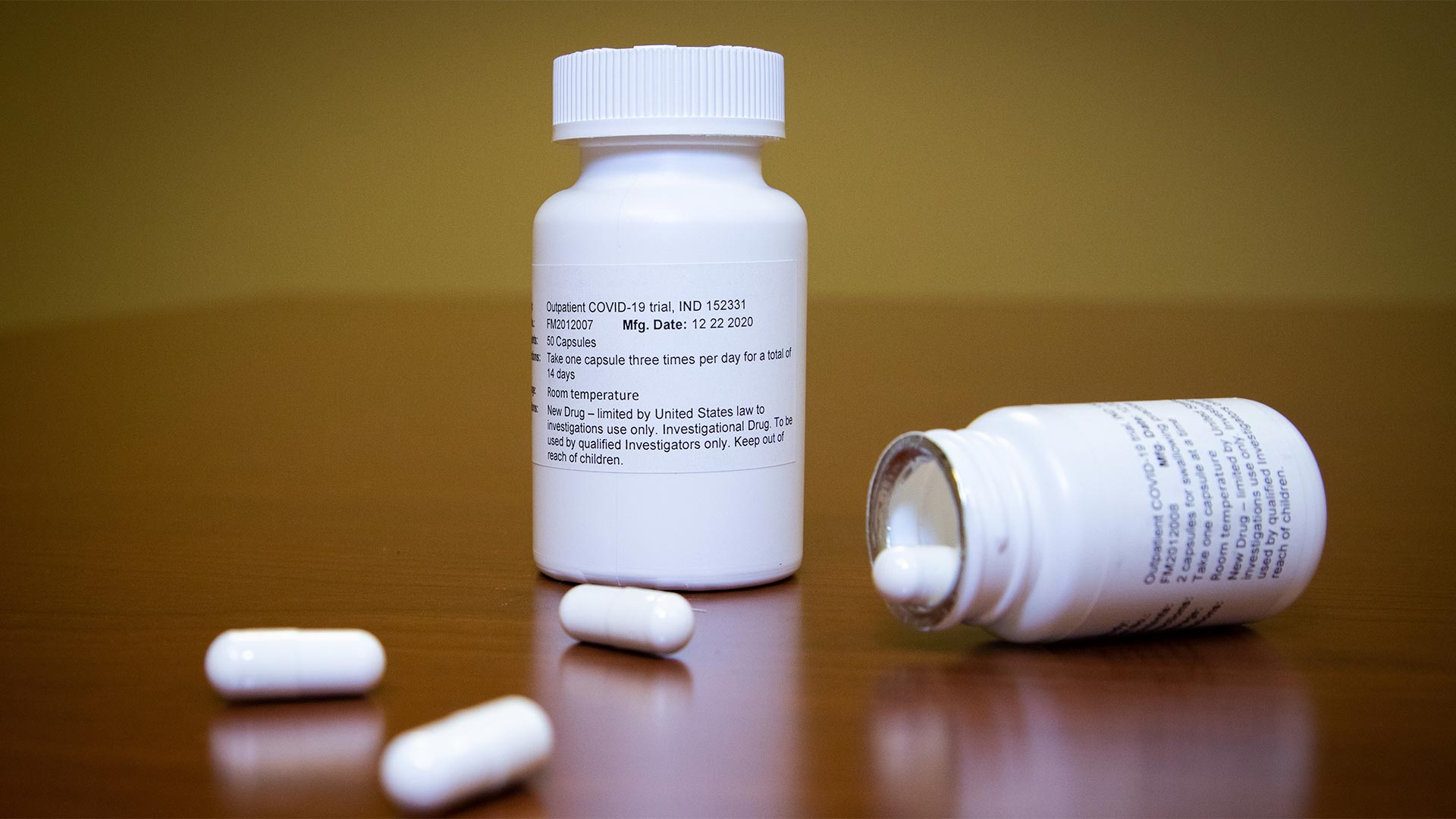A high dose of famotidine, commonly known as Pepcid®, was found to have beneficial effects in adult patients with coronavirus disease 2019 (COVID-19), according to results of an outpatient clinical trial. Patients who took famotidine in this trial experienced a decrease of inflammation within the body and reported earlier alleviation of symptoms. Findings from the trial, led by The Feinstein Institutes for Medical Research at Northwell Health and Cold Spring Harbor Laboratory (CSHL) were published in February, 2022 in the journal Gut.
Famotidine is a safe, low-cost, over-the-counter drug usually used to treat heartburn. People with COVID-19 often get sick because the body’s inflammatory response to the virus gets overactivated. Previous studies have shown that famotidine turns inflammation down by blocking a specific molecular pathway. This trial confirms that famotidine leads to earlier resolution of inflammation in patients with COVID-19 and also alleviates symptoms of the disease, while the acquisition of immunity against the virus that causes COVID-19 is maintained. Because famotidine does not target the virus directly like vaccines or anti-viral medications, it may be a promising potential treatment for patients with COVID-19 and emergent viral variants.
“We found that famotidine is safe at the higher doses used, and see molecular and clinical evidence that it improves the recovery of symptomatic patients of diverse ancestries diagnosed with COVID-19,” said Tobias Janowitz, M.D., Ph.D., the principal investigator of the trial, an assistant professor at CSHL and adjunct professor at the Feinstein Institutes. “We closely monitored patients in this fully-remote clinical trial while protecting their safety and that of health care providers in pandemic conditions. We hope that the data we are sharing with this study guide future trials that are necessary to confirm famotidine as a treatment for patients with COVID-19.”
The trial, which was launched in January 2021, was an entirely remote, randomized, double-blind, placebo-controlled clinical trial to evaluate the safety and efficacy of famotidine in diverse patient populations. It was designed to keep trial participants out of the hospital throughout their treatment by enabling participation from home. Additionally, in collaboration with New York City Health + Hospitals, eligible patients residing in COVID-19 quarantine hotels were approached to participate, which helped diversify enrollment. Analysis of the trial was supported by statisticians from Stony Brook University.
“Our institutions worked extremely well together to face challenges the pandemic posed, like offering digital solutions and reaching populations who struggled for access to care,” said Christina Brennan, MD, vice president of clinical research at the Feinstein Institutes and co-investigator of the trial. “From screening patients to organizing home delivery of the equipment and medication, this sets a new model for future trials and convenience for participants.”
Adult COVID-19-positive patients with mild to moderate symptoms were sent a cellular-activated Apple iPad, along with a Bluetooth-enabled scale, thermometer, fitness tracker, spirometer (to study air flow in and out of the lungs), and pulse oximeter (to measure blood oxygen levels). Nearly two-thirds of patients enrolled were from Black, mixed-race, or Hispanic communities.
“Accessible, safe, and low-cost outpatient treatment options are a priority in our global efforts to combat COVID-19. Northwell Health and New York City Health + Hospitals provided care for the communities most in need of support in NYC,” said Nicole Jordan-Martin, the executive director for New York City Health + Hospitals/Community Care which operates the NYC Test & Trace Corps Take Care Hotel Program; their team helped connect guests to the clinical trial coordinators at the Feinstein Institutes. “Many of our nursing staff and guests at Take Care hotel sites made an important contribution to the trial.”
Either placebo or famotidine at 80 mg, three times per day was prescribed and taken orally for a maximum of 14 days by 55 non-vaccinated participants—28 received placebo and 27 received famotidine. The patients tolerated the dosage of medication very well. Northwell’s Home Lab program was used for required blood draws and COVID-19 diagnostic nasal swabs tests. Participants who took famotidine experienced quicker resolution of inflammation in the body, according to blood work results. In addition, the patients who took famotidine experienced more rapid and better resolution of 14 out of 16 assessed symptoms, including improvement in breathing, chest congestion, cough, and abdominal pain. The prespecified primary endpoint, an earlier resolution of the sum of all symptom scores, was not reached at statistical significance.
“In today’s virtual world, our clinical trial strategy has significant implications for how to study new drugs in patients at home,” said Kevin J. Tracey, MD, president and CEO of the Feinstein Institutes and member of the study team. “Because SARS-CoV-2 continues to infect millions, the data from this trial of an effective, safe, cheap, generic drug should be valuable to global efforts to find safe and affordable therapies to treat COVID-19.”
Written by: Dagnia Zeidlickis, Vice President, Communications | zeidlick@cshl.edu | 516-367-8455
Funding
Pershing Square Foundation, Emergent Ventures Fast Grant, Dr. Lee MacCormick Edwards Charitable Foundation, Northwell Health, New York City Health and Hospitals Corporation, Cold Spring Harbor Laboratory, National Cancer Institute, Starr Centennial Scholarship at CSHL, La Caixa Foundation Fellowship, Medical Research Council Cancer Unit Research Studentship, National Institutes of Health
Citation
Brennan, C.M., et al., “Oral Famotidine vs Placebo in Diverse Non-hospitalized Patients with COVID-19: a Randomized Double-blinded Phase 2 Clinical Trial”, Gut, February 10, 2022. DOI: 10.1136/gutjnl-2022-326952
Principal Investigator

Tobias Janowitz
Associate Professor
Cancer Center Program Co-Leader
M.D., Ph.D., University of Cambridge, UK, 2007

